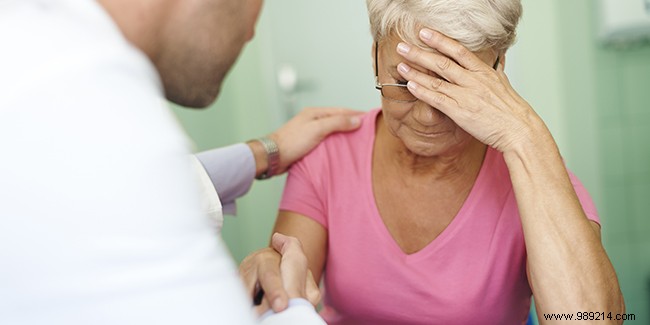
Depression in the elderly is not a state or a feeling, it is a mental illness that is far from rare. It is characterized by mood disorders and has a very negative impact on everyday life. The causes of depression are numerous, they can be of psychological, biological and environmental origin. What are the signs of depression? How do you know if you have it? Explanations.
Nervous breakdown, more commonly called depression, is a mental illness. It is therefore distinguished from the sudden fatigue or the small temporary depression. A depressed person sees his daily life turned upside down. She suffers from sleep disorders, appetite and sexual desire, a loss of intellectual performance and sometimes even isolation. Depression is accompanied by sadness and pessimism. This state is not temporary, moreover depression is proven if the malaise lasts more than two weeks. Depression is difficult to manage. In the vast majority of cases, the will is not enough to cure it. Outside help is needed, especially medical help. Without it, depression can become chronic and have serious consequences.
Just because you feel depressed doesn't necessarily mean you have depression. Seasonal or transient depression is not as pronounced as depression. It is accompanied by a lack of energy and motivation, a drop in morale and general malaise. Feeling depressed is completely normal following an event. This is a time-limited reaction.
The mechanisms of depression remain a mystery to doctors and researchers to this day. Several situations can lead to depression. Here are some examples.
Depression is favored by the presence of a chronic illness, a disability, excessive consumption of alcohol or drugs. Some people are more prone to depression. This vulnerability cannot be explained, it is genetic. When a parent is depressed, a child's risk of depression is greater.
According to the WHO, the World Health Organization, there are 9 characteristic symptoms of depression:
Patients with more than 5 of these symptoms are considered depressed. If 8 symptoms are found, then the depression is severe.
The treatment of depression is done at different levels. Treatment is both medicinal and psychological. The drugs act on the brain whose functioning is impaired by the disease. Psychology allows the patient to free himself through speech. This multidisciplinary management is essential to reduce the risk of relapse, which is very high.
Psychotherapy is essential to identify the causes of depression. By talking about his discomfort, the patient begins the work of healing. To be beneficial, psychotherapy sessions must be regular. The optimal rhythm is two sessions per week, at least initially, for several months.
Antidepressants represent drug treatment. They consist of psychotropics whose role is to reduce mood disorders. The side effects of antidepressants are considerable and also impact the well-being of patients. Treatments based on psychotropic drugs are considered over the long term.
Depression can subside and disappear on its own. Unfortunately, when this is the case, it reappears in the years that follow, most often within 5 years. The more relapses, the higher the risk of relapse. It is therefore imperative to follow the treatment proposed by health professionals and not to stop it in progress. Depression is not to be taken lightly. This disease greatly increases the risk of suicide. this is multiplied by 20. Depression also pushes victims to take more risks and sometimes to mutilate themselves.
It is difficult to prevent depression, but it is not impossible. People at risk have every interest in finding solutions to feel good on a daily basis and especially to feel better when morale is low. Here are some tips.
It is important to have a healthy lifestyle. Eating a balanced diet, getting enough sleep and having regular physical activity, in short, having a healthy lifestyle is the best way to avoid sinking into depression. It is also necessary to go out every day to expose yourself to natural light and reduce sedentary lifestyle. Going out for a walk or doing activities is a great way to maintain social ties. It is necessary to favor moments with family or friends.
If you have a drop in morale and you think that a form of depression is setting in, do not hesitate to contact your doctor and why not a "psychiatrist":psychiatrist, psychologist, psychoanalyst or psychotherapist with been authorized by the ARS to register on the national register of psychotherapists.
Being affected by depression is one thing, but the disease can affect someone close to you. In this case, it is important to recognize it and adopt the right attitude. How ? If you notice that your loved one is isolating himself, that he is sad or negative, and that it lasts, then you have to worry. It is important to talk to the person who is suffering, make them understand and admit that they need help. Support is important!